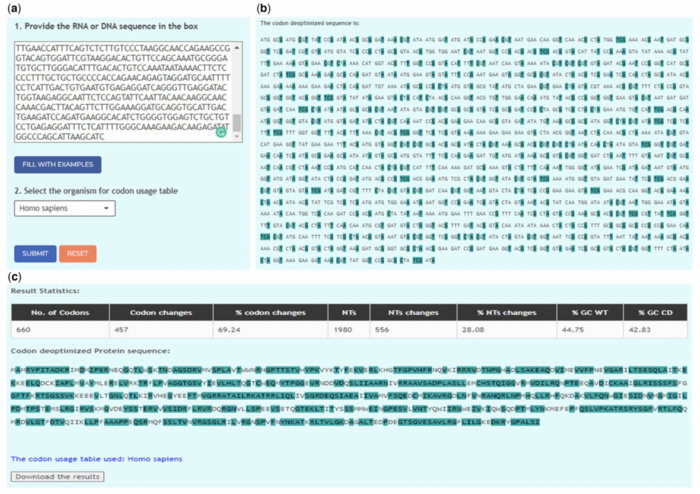SAN ANTONIO (March 15, 2023) — A new software tool developed by Texas Biomedical Research Institute and collaborators can help scientists and vaccine developers quickly edit genetic blueprints of pathogens to make them less harmful.

Credit: Texas Biomed
SAN ANTONIO (March 15, 2023) — A new software tool developed by Texas Biomedical Research Institute and collaborators can help scientists and vaccine developers quickly edit genetic blueprints of pathogens to make them less harmful.
The tool, called CoDe – short for Codon Deoptimization – enables users to make precise edits to a genetic code to make genes less functional – in other words, to deoptimize the genes.
Often, vaccine developers want to optimize or turn up expression of certain genes, and there are plenty of software tools to help with that. But for some types of vaccines, it is critical to deoptimize, or turn down, certain genes, to make the vaccines safe and effective.
“There were no tools to help with deoptimization until now,” explains Texas Biomed Professor Luis Martinez-Sobrido, PhD, who led the team behind CoDe.
Dr. Martinez-Sobrido is an expert in virology and vaccine development. He teamed up with bioinformatics experts at the Indian Institute of Technology, Madras and a virologist at the Center for Animal Research in Spain to build CoDe. They recently described their tool in the journal Bioinformatics Advances.
Turning down gene expression can be useful for a wide range of research, and is particularly important for developing live attenuated vaccines. This type of vaccine includes the full genetic sequence of a virus, rather than just a small part of the virus. But the virus has been attenuated, or tweaked, to not cause disease. This is a common vaccine platform that has been used for influenza, smallpox, yellow fever, and mumps, measles and rubella.
This type of vaccine aims to elicit long-lasting, robust immunity, and it is imperative that the virus has been attenuated enough so that it cannot revert back to its original form.
“With CoDe we can precisely mutate thousands of nucleotides in a single gene, which makes it extremely difficult for the virus to revert,” Dr. Martinez-Sobrido says. “It also enables us to modulate gene expression of small sections, rather than knocking out entire genes completely. That is very helpful for vaccine design as well as basic research.”
Users tell CoDe what genetic sequence to deoptimize. The program identifies what specific nucleotides, or letters, of the genetic code to change that result in a functional, but harmless version of the virus.
A neat feature of the program: it can automatically convert the edits needed to attenuate a vaccine designed for different species. For example, an influenza vaccine will differ for pigs versus chickens versus humans.
While designed for viruses, CoDe can easily be adapted for other organisms, such as bacteria.
“Scientists have been waiting for this kind of tool because before they were doing it by hand,” explains Tracey Baas, PhD, Texas Biomed’s Innovations Manager. “This will help them make edits faster, and avoid the potential for mistakes than can occur through human error.”
The tool is copyrighted, but freely available for others in academic settings to use. Commercial entities interested in using CoDe can reach out to Dr. Baas.
###
About Texas Biomed
Texas Biomed is a nonprofit research institute dedicated to protecting the global community from infectious diseases. Through basic research, preclinical testing and innovative partnerships, we accelerate diagnostics, therapies and vaccines for the world’s deadliest pathogens. Our San Antonio campus hosts high containment laboratories and the Southwest National Primate Research Center. Our scientists collaborate with industry and researchers globally, and have helped deliver the first COVID-19 vaccine, the first Ebola treatment and first Hepatitis C therapy. For more information, go to www.TxBiomed.org.
Journal
Bioinformatics Advances
DOI
10.1093/bioadv/vbac102
Article Title
CoDe: a web-based tool for codon deoptimization
Article Publication Date
2-Jan-2023




